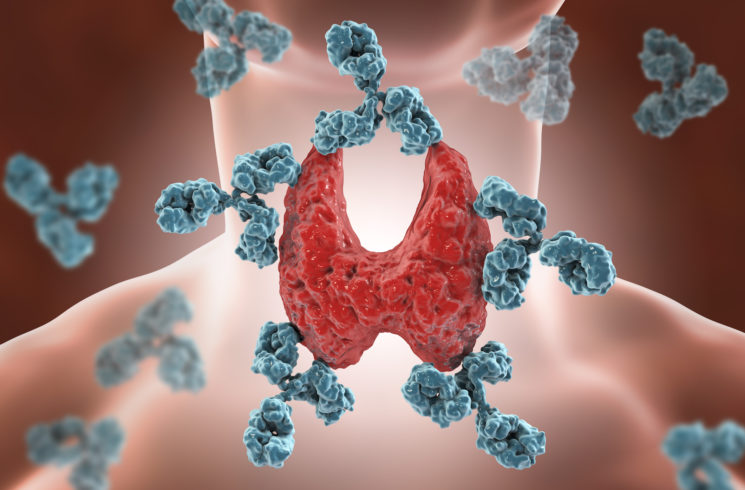
I Have Hashi- What?!
If you find yourself having trouble pronouncing your diagnosis- then you may have Hashimoto’s thyroiditis. It means that your immune system is mistakenly attacking your thyroid gland. Its name comes from the Japanese surgeon who first discovered the illness. If your doctors tell you that Hashimoto’s thyroiditis has no treatment, they may not know about the natural approaches that give so many people relief.
See “Natural Treatments for Hashimoto’s,” part 2 of this article, for ways that your doctor can reduce your thyroid antibodies and get you feeling better fast.
First, let’s refresh ourselves on why it’s critical for the thyroid gland to be in good working order. The thyroid is “the master regulator” and is responsible for the body’s energy and metabolism. There are thyroid hormone receptor sites present throughout the whole body that help determine how energy is used by the body. The thyroid is responsible for a number of bodily processes, including brain function, growth and development, mood, sexual and reproductive function, and metabolism rate.
The most common cause of an underactive thyroid is Hashimoto’s hypothyroidism, an autoimmune disease of the thyroid. In Hashimoto’s, the immune system is faulty and mistakenly attacks the body’s own healthy cells. Antibodies are produced against the proteins in the thyroid gland and prevent the thyroid from doing its job. Thyroid function is decreased because of the gradual destruction of the gland and reduced production of thyroid hormones. Ultimately, many of the body’s metabolic processes slow down.
Here are the symptoms of Hashimoto’s hypothyroidism:
|
|
Don’t have Hashimoto’s disease? You may be interested in a related topic, “Thyroid Function: The Biochemistry Within,” which covers hypothyroidism.
Why is the Immune System Confused?
It is not well known why the immune system is confused but experts believe that it is probably a case of mistaken identity. One theory suggests that it begins with a healthy immune attack on a “bad guy” molecule. The immune system gets confused because the “bad guy” molecule looks very similar to the “good guy” molecules in the body and attacks both. Of course, attacking the “good guy” molecule means that the patient’s own body is under attack by her immune system and this can leave her feeling terrible.
Hashimoto’s hypothyroidism has been linked to gluten intolerance, which is another example of mistaken identity. Patients with Hashimoto’s thyroiditis seem to feel better and lower their antibody levels when they remove gluten and dairy from their diet. While this isn’t completely understood, one explanation is that gliadin looks similar to the proteins of the thyroid gland, and the immune system attacks both. In addition, gliadin weakens the immune system from the inside out by deteriorating the protective barrier of the gut and allowing it to enter the bloodstream, creating an autoimmune inflammatory response. This weakening of the barrier is called “leaky gut.” Ultimately, this mechanism allows the immune system to attack the thyroid gland if gluten-containing foods are eaten, especially since traces of gluten can irritate the immune system for months.
Unfortunately, it is not only gluten that creates an autoimmune response in clinical cases with Hashimoto’s hypothyroidism. There are other food proteins that create a similar immune system reaction as gluten does, causing the body to attack itself. Check with your doctor to figure out if you have leaky gut or food sensitivities.
Nutrient deficiencies, infection, and stress are other factors that can make a person susceptible to autoimmune thyroiditis. Check with your doctor to figure out if poor nutrition, infection, or your lifestyle may be preventing your immune system from working properly.
Testing for Hashimoto’s
Hashimoto’s hypothyroidism is diagnosed based on your symptoms and your lab results. There are different kinds of hypothyroidism but a blood test showing high TSH is usually an important factor in detecting hypothyroidism. TSH tells the body that thyroid hormones are too low and to make more. The key to identifying Hashimoto’s hypothyroidism is unusually high levels of thyroid antibodies in laboratory blood work. The presence of thyroid antibodies in your blood tells your doctor that the immune system is attacking the thyroid gland. To get the full story on your thyroid function, we recommend a Complete Thyroid Profile such as this one: Thyroid Profile.
In Hashimoto’s thyroiditis, the immune system makes antibodies against thyroid peroxidase (TPO) and thyroglobulin (Tg). TPO is an enzyme that puts iodine into the thyroid hormone molecule. Tg is an important protein, essential in the creation of thyroid hormones. The presence of antibodies to these proteins in blood indicates that the thyroid is being damaged by the immune system, which establishes the diagnosis of an autoimmune thyroid condition. Read more about thyroid biochemistry and testing here.
Summary
While it may sound like an exotic, Asian-inspired cocktail, Hashimoto’s thyroiditis is actually an illness brought about by a misplaced immune attack of the thyroid gland. High TSH and high blood antibodies tell your doctor that the thyroid gland cannot do its job properly. Symptoms include fatigue, weight gain, puffy face, constipation, and dry, thinning hair, among others.
Your integrative medical doctor can develop a comprehensive treatment approach that will (1) calm down the immune attack, (2) lower antibodies, and (3) get you feeling better in the long run. We will go into more detail about action steps to reduce your symptoms of Hashimoto’s thyroiditis in “Natural Treatments for Hashimoto’s,” part 2 of this article.
